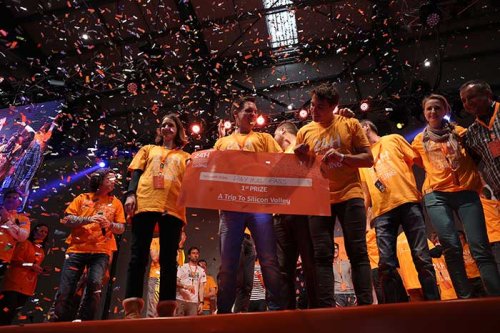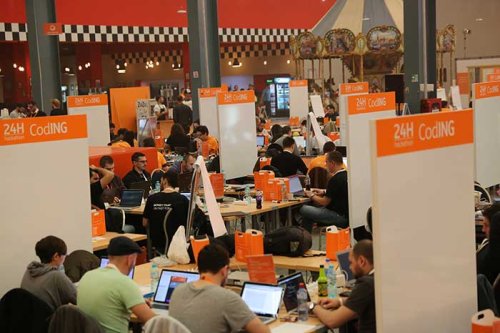Ease and simplicity wins first prize
23 November 2015
A simple mobile payments system that doesn’t require complex IT support infrastructure has taken first prize in the third global ING hackathon.
More than 300 young software developers from across the globe raced against the clock in Bucharest, Romania on 20 November to develop the next big idea in digital banking.
For a full day and night, and maybe a bit more, a giant indoor recreational area in the heart of Bucharest’s IT precinct was home to hundreds of young ‘digital natives’, working in teams to develop the next generation digital bank.
A Romanian team, PayINGPass, came top of the field, because of the simplicity of their idea, and because it fitted well a key aspect of ING’s strategy which is to make banking easier.

PayINGPass team
Second prize went to a team which worked on developing banking technology for the disabled, using the power of thought.
An idea linking financial fitness to physical health claimed third prize. An overview of all the teams and their ideas can be found on the event’s website.
Jury member, chief innovation officer Brunon Bartkiewitz said: “Events like these, and of course ING’s Innovation Bootcamp, make people at ING aware that innovation can be organised, can be extremely inspirational, can generate great ideas and that we actually do something with these ideas.”

Software developers
A total of 318 developers from nine countries, grouped in 43 teams, were selected to take on the Hackathon challenge: to build within 24 hours a ‘minimum viable product’, a working version of a new product with some core features which can be tested on real customers.
Most participating teams (26) came from Romania. The Netherlands sent six teams, with other entrants coming from Austria, Belgium, Germany, Poland, Singapore, Spain and Turkey (the three winners of the ING Turkey Hackathon which was held from 6-8 November). Almost half of the participants were ING employees, the other half were external developers from Romania.
High tech workspaces, orange hammocks and more than 100 beds replaced climbing walls and indoor ski tracks for 24 hours in the indoor recreational area.
